| |
| |
 |
| |
| |
|
| Past Productions :- |
| |
Full Length Drama -
|
Short Length Drama -
- BIDHB O-BETIKRAM
- TARASHER BHAT
- Tagore's RATHER RASHI
- JAGARAN
- AAYNA
- PADMO GOKHRO
- PRASTAB
Docu-Drama -
|
| |
| |
| |
|
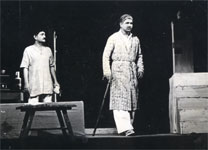 An adaptation from Harold Pinter's "The Home Coming" An adaptation from Harold Pinter's "The Home Coming"
Sri Avik Mitra, a professior in J.N.U. comes to visit his parental home at Siliguri with his wife Ena and finds his family still living in the said house. In the conflict that follows, it is Ena who gradually becomes the focus of the family's resurrection from mental destitution.
This play was first staged on 29th August 1994. |
| |
| |
|
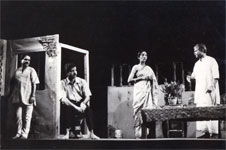 Inspired by Lorraine Hansberry's "A raisin in the Sun" Inspired by Lorraine Hansberry's "A raisin in the Sun"
Mahamaya Sen and her family are forced to leave their ancestral home in Bangladesh in 1971 and pick up the threads of life once more, soon to be deserted by her husband. Amidst joys and sorrows, and vicissitudes of fortune they only accumulate numerous experiences of life. Yet though the path of life is not a smooth one, they can still dream and Mahamaya along with her elder son Manjul, daughter-in-law Subha, daughter Bulbul, and youngest son Apu, cling the hope and dream.
This play was first staged on 21st August 1996.
|
| |
| |
|
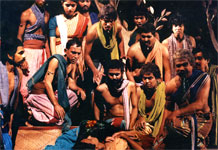
With the aim to re-interpret the classical epic Ramayana from a sociological standpoint in order to prove its relevance in the modern world and to instill appreciation for our traditional values among the younger generation and in order to show the spirit of India as depicted in Ramayana.
Sudrayana was first staged on 01.02.1998.
|
| |
| |
|
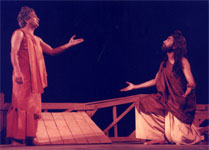 The drama relates to the conflict between Mahayana Buddhism's endeavours at social reforms and the Vajrayana Buddhist sect's narrow individualist approach that was in prevail in Bengal, one thousand years ago to this had been added the conflict between Buddhism and Brahmanical Hinduism on one side and the conflict between rich trading community and the struggling sailor-fisherman-kaivarta class on the other side who wanted their independence from oppression of the trading merchant community, with the help of the Mahayana Buddhists and Atisha Dipankara, the first Bengali intellectual has become the catalist . The drama relates to the conflict between Mahayana Buddhism's endeavours at social reforms and the Vajrayana Buddhist sect's narrow individualist approach that was in prevail in Bengal, one thousand years ago to this had been added the conflict between Buddhism and Brahmanical Hinduism on one side and the conflict between rich trading community and the struggling sailor-fisherman-kaivarta class on the other side who wanted their independence from oppression of the trading merchant community, with the help of the Mahayana Buddhists and Atisha Dipankara, the first Bengali intellectual has become the catalist .
This drama was first staged on 09.01.2000
|
| |
| |
|
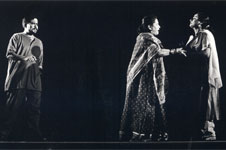 Though this play is about contemporary times, yet it cannot be limited to one particular period of time. The problems and confrontations depicted here can be regarded as certain obstacles faced by society in its evolution. When human beings overcome these obstacles, it is regarded as a victory of mankind. In the year 2002 when the people of this country witnessed some communal unrest in Gujarat Sanglap Kolkata was the leading group theatre in Kolkata to awaken the consequence of the evil of communalism by staging this drama on 19.09.2002 Though this play is about contemporary times, yet it cannot be limited to one particular period of time. The problems and confrontations depicted here can be regarded as certain obstacles faced by society in its evolution. When human beings overcome these obstacles, it is regarded as a victory of mankind. In the year 2002 when the people of this country witnessed some communal unrest in Gujarat Sanglap Kolkata was the leading group theatre in Kolkata to awaken the consequence of the evil of communalism by staging this drama on 19.09.2002
|
| |
| |
|
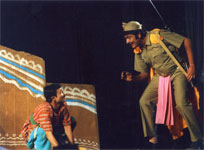 This drama is apparently based on an age old fairy tales of Bengal. A king activated by a pair of horns on his head is bent upon bringing the world within his grasp. He gives two options, that of surrendering to him or give him battle. There is a scientist to help him with weapon of mass destruction and the legendary heroes Lalkamal and Neelkamal. In Diksunnipur lives a barber named "Bhavam" who though fearful by nature is wise and honest. Under the direction of Talking Bird "Bangama" and others Bhavam and his constant companion Mule (Khachhar) agree to give battle to the Horned-King. If Bhavam wins, he will save the world. Will people like Bhavam have a chance against the might of the evil forces? This drama is apparently based on an age old fairy tales of Bengal. A king activated by a pair of horns on his head is bent upon bringing the world within his grasp. He gives two options, that of surrendering to him or give him battle. There is a scientist to help him with weapon of mass destruction and the legendary heroes Lalkamal and Neelkamal. In Diksunnipur lives a barber named "Bhavam" who though fearful by nature is wise and honest. Under the direction of Talking Bird "Bangama" and others Bhavam and his constant companion Mule (Khachhar) agree to give battle to the Horned-King. If Bhavam wins, he will save the world. Will people like Bhavam have a chance against the might of the evil forces?
This drama was first staged on 11.01.2004.
|
| |
|
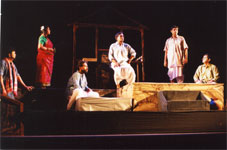
In the year 2005 the Youth Services Department of the Government of West Bengal, organized a Theatre Festival in order to celebrate the 50 years of Anti-Fascist Movement and the 75th birth anniversary of the great theatre activist, late Utpal Dutta. Sanglap Kolkata took the challenge to stage "Ferari Fouz" - one of the most successful productions of late Dutta and his group L.T.G.
|
| |
| |
ASTARAG : |
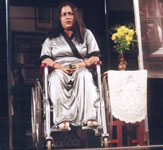
This play is about interplay of human emotions. The concept of right and wrong is in a constant flux, within different aspects of relationship between each generation. This play has aimed at touching this concept, to question whether it is possible to cling to one's ideal in today's uncertain complicated world. To fathom some of the answers would be the viewer's quest.
This drama was first staged on 12.02.2006.
|
| |
|
| |
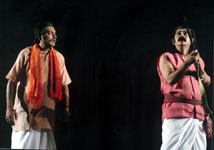 This is the story of two men Raghubir & Raghav. Aggression on Land and Women seems a natural machismo to Raghubir. Janki, Urmila, Lachman, Dharitri, Bharat, Hanuman are all slaves to his dominant will. This stranglehold of loveless, irresponsible imposition of aggressive will is torn asunder by a trusted supporter. After a long period of 25 years the stranglehold of Raghav's pride and voracious lust is again crushed by his own henchman. This eternal conflict between chauvinistic aggression and humanity and creates the circuitous path.
The curtain raiser of this drama was held on 11.09.2007
|
| |
| |
LATHI KANDA |
Almost at the evening Nabin is going to Haripur, his home village along with an amount of rupees Thirty five thousand in his possession. Uncle Haribole considering this journey through the vast tract of Bhurpun, handed over to Nabin the stick of Sadhubaba for his security and safety. Because inside the dilapidated fort which is adjacent to said Bhurpun field the two most notorious dacoits Genni and Pyana are awaiting to snatch the said money from Nabin. Their accomplice Nemai has already been an acquaintance of Nabin in this journey. The drama portraits the plight of Nabin in reaching his home safely with the help of the stick of Sadhubaba which is a symbol of honesty and courage and also proved that the common people shall overcome any impediment with their sheer determination, honesty and courage.
This drama was first staged on 08.11.2008. |
| |
|
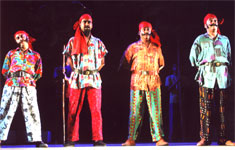 |
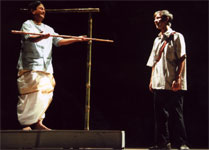 |
|
| |
|
| |
| Present Production :- |
| |
AMOL SYNDROME |
| |
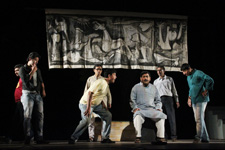 The Pressures of contemporary life has left Professor Amol Sen feeling secluded from everyone. His
childhood teacher Mohit Sir, advises him to shelter within the creative works of Rabindranath Tagore.
Amol henceforth finds solace in the Bard’s creations, but soon begins to hallucinate and see people like
his dead Grand Father, characters of Tagore’s like Nantu Curd-seller, Balai and others. Matters come to
such a pass that Amol becomes a source of embarrassment for his wife Madhavi, daughter Nandini and
neighbors. A medical board is summoned, where Rabindranath appears and explain that Amol’s behavior
has to be defined, not through the parameters of normalcy, but as a new way of perceiving the future.
This behavioral pattern is termed as “Amol Syndrome” and it is likely to spread and go viral. Amol
perceives that Rabindranath himself has arrived to help him and leaves with him, agog to face life with
renewed vigor. |
| |
| Play write & Direction : KUNTAL MUKHOPADHYAY |
| |
|
| |
| |
| Nirashray |
| |
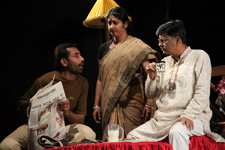 Within the happy fMifly circle of Subinoy Sen and Kanta Sen Suddenly appears Satya Mitra, an Official of Central Intelligence. Satya informs them that Kanta Sen's previous husband Jayanta Roy, missing and presumed dead for the last twenty five years is about to return. It is Satya Mitra's job to ensure that Jayanta Roy is accepted within the Sen family. Will Jayanta Roy render the Sen family homeless? Or will the Sen family render jayanta homeless. Where is Jayanta to live? What would be his identity and place within the family? Seeking answers to these problems, mental dilemma give place to flickering humanitarian sympathies. Do we in any way feel homeless due to this lack of shelter? |
| |
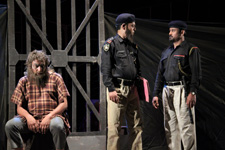 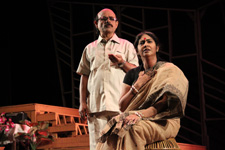 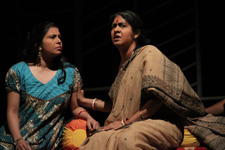
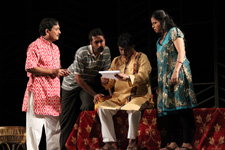 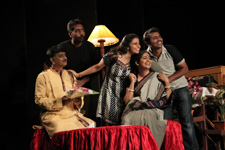 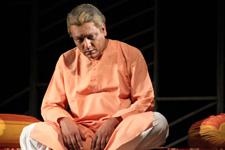
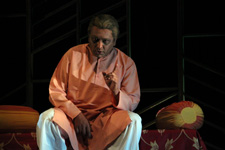 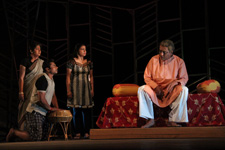 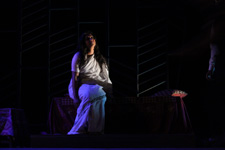
|
| |
| |
| Ratnakar |
| |
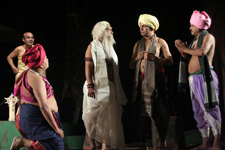 Ratnakar is the saga of a Journey. Within the outlaw Ratnakar, the sage Rishvasringha is able to invoke a spark of contemplation, asking him to interrogate - to question everything around him, which would be the only way to understand himself and his surroundings. Seeking answer to these questions, transforms Ratanakar to Valmiki. Taking upon himself the task of mitigating the hardship of the tribals living in the forest, Ratnakar renounces violence and takes the path of love to contemplate about everything. Forsaking the worship of Shakti or might, it takes up the worship of Sharada or Learning. In Gurudev Rabindranath's "Valmiki Prativa", Ratnakar transforms to Valmiki in this way.
In today's India it has become necessary to show our forest dwellers that the path of peace is the only way towards self aggrandisement. Revoking the way shown by Gurudev Rabindranath we too hope to take the path of peace. We must understand Modernity through tradition, venerate Gurudev through a flower picked from his own bouquet. |
| |
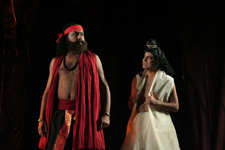 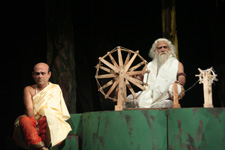 
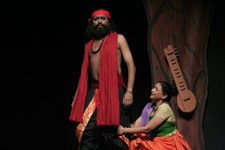 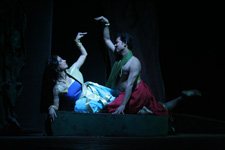 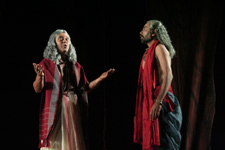
|
| |
| |
| Ishwarer Khonje |
| |
This Drama was first staged on 12.01.2016 at Academy of Fine Arts.
Next show on 16.01.2016 at Girish Mancha.
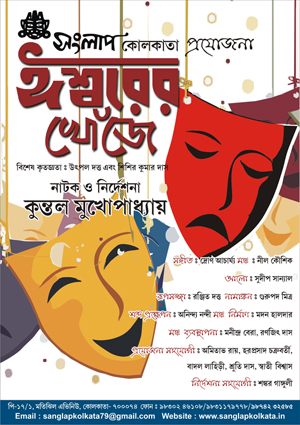
|
| |
| |
 |
|
|